形容词定义
形容词基本用法
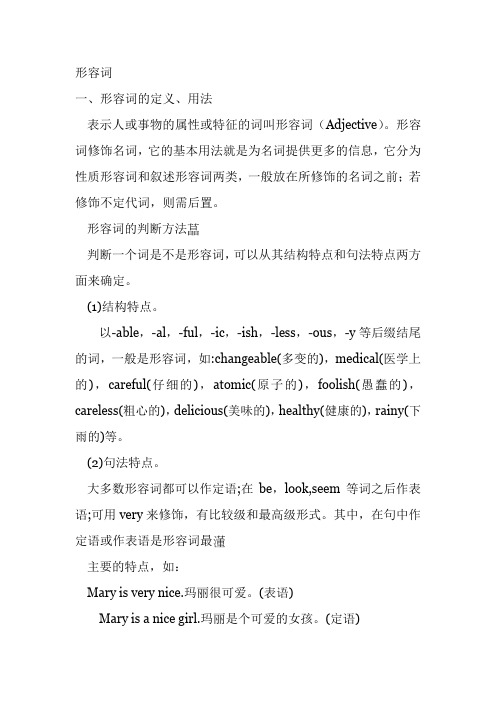
形容词一、形容词的定义、用法表示人或事物的属性或特征的词叫形容词(Adjective)。
形容词修饰名词,它的基本用法就是为名词提供更多的信息,它分为性质形容词和叙述形容词两类,一般放在所修饰的名词之前;若修饰不定代词,则需后置。
形容词的判断方法判断一个词是不是形容词,可以从其结构特点和句法特点两方面来确定。
(1)结构特点。
以-able,-al,-ful,-ic,-ish,-less,-ous,-y等后缀结尾的词,一般是形容词,如:changeable(多变的),medical(医学上的),careful(仔细的),atomic(原子的),foolish(愚蠢的),careless(粗心的),delicious(美味的),healthy(健康的),rainy(下雨的)等。
(2)句法特点。
大多数形容词都可以作定语;在be,look,seem等词之后作表语;可用very来修饰,有比较级和最高级形式。
其中,在句中作定语或作表语是形容词最主要的特点,如:Mary is very nice.玛丽很可爱。
(表语)Mary is a nice girl.玛丽是个可爱的女孩。
(定语)He was asleep.他睡着了。
(表语)She is a perfect teacher.她是位十全十美的老师。
(定语)形容词的用法1.形容词用作定语Li Mei is a beautiful city girl.李梅是一个漂亮的城市女孩。
The new student comes from Japan.那个新来的学生是日本人。
2.形容词用作表语My father’s car is very expensive.我父亲的小车很贵。
The English story is very interesting.那个英文故事很有趣。
3.形容词用作宾语补足语Don’t keep the door open. 别让门敞着。
His success made him happy.他的成功让他感到幸福。
初一英语形容词和副词语法知识总结(讲解+考点+综合练习):形容词和副词
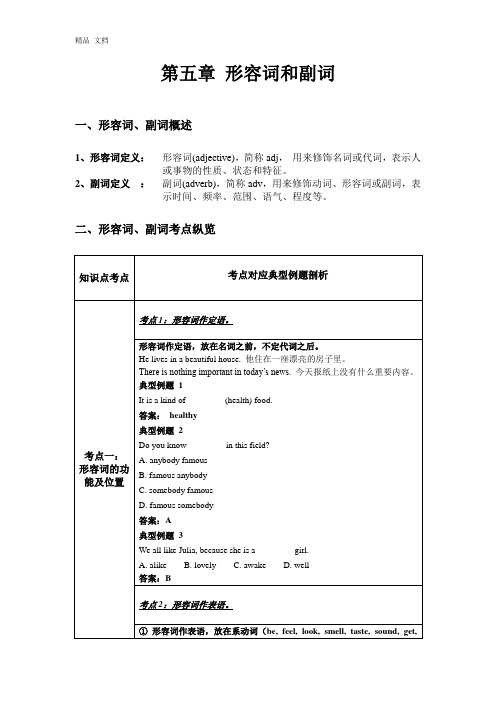
第五章形容词和副词一、形容词、副词概述1、形容词定义:形容词(adjective),简称adj,用来修饰名词或代词,表示人或事物的性质、状态和特征。
2、副词定义:副词(adverb),简称adv,用来修饰动词、形容词或副词,表示时间、频率、范围、语气、程度等。
二、形容词、副词考点纵览三、综合练习( )1. –If you don’t like the red coat, how about the green one?–OK, but do you have _______ size in green? This one is a bit small for me.A. a bigB. a biggerC. the bigD. the bigger( )2. –Mum, I think I’m _______ to get back to school.–Not really, my dear. You’d better stay at home for anoth er day or two.A. so wellB. so goodC. well enoughD. good enough ( )3. –What delicious cakes! –They will taste _______ with butter.A. goodB. betterC. badD. worse( )4. –Mr. Zhou , of all the students in our group, who lives _______ ?–I think Li Lei does.A. farB. fartherC. farthestD. the farther( )5. With a history of more than 1,400 years, ZhaoZhou Bridge is the _______ stone arch bridge in the world .A. oldB. olderC. oldestD. elder( )6. Bob never does him homework _______ Mary. He makes lots of mistakes.A. so careful asB. as carefully asC. carefully asD. as careful as ( )7. A: How can I speak English _______ you?B: You’d better speak more, I think.A. as good asB. more thanC. as well asD. as much as( )8. Your English is good. I’ll try my best to speak it as _______you do.A. clearly asB. clear asC. clearer thanD. more clearly ( )9. –Is your mother badly ill?–No, _______ , only a little cold.A. serious anythingB. serious nothingC. nothing seriousD. anything serious( )10. I’m not sure if I’m going to Tim’s party; I may go to the concert _______ .A. onlyB. insteadC. earlyD. late( )11. Although they are brothers, they are the _______ opposite of one another.A. veryB. justC. fewD. little( )12. The new Bright Restaurant is _______ than the old one. Moore and more people like to eat there.A. goodB. betterC. badD. worse( )13. Wang Ping does _______ in physics that I missed the first class.A. badlyB. Most badlyC. worseD. worst( )14. I got up so _______ this morning that I missed the first class.A. earlyB. lateC. quietlyD. neatly( )15. –Do you enjoy traveling by plane?–No. It’s _______ expensive.A. much moreB. more muchC. too muchD. much too( )16. I’m afraid the headmaster is _______ busy to meet the visitors.A. too muchB. much tooC. so muchD. much too( )17. How beautifully she sings! I’ve never heard _______ .A. the better voiceB. a good voiceC. the best voiceD. a better voice( )18. You do well in your lessons. I’m _______ you will pass the exam.A. sureB. afraidC. sadD. sorry( )19. –Who is _______ in your class?–Fred.A. tallB. tallerC. tallestD. the tallest( )20. –What do you think of the football match?–Wonderful! The Chinese football team has never played _______ .A. betterB. bestC. worseD. worst( )21. The population of China is _____ than _____ of any other country in the world.A. larger , the oneB. more , thatC. larger , thatD. more , the one ( )22. There is much wine here, but _______ people want to drink it.A. manyB. a littleC. fewD. a few( )23. People speak ______ of the film Not One Less. It is really necessary for every child to go to school.A. loudB. loudlyC. highD. highly( )24. She always finishes her homework on time. She ______ leaves it for tomorrow.A. alwaysB. neverC. usuallyD. sometimes( )25. The football match was _______, so the boys were _______ about it.A. excited , excitingB. exciting, excitedC. excited , excitedD. exciting , exciting( )26. Playing table tennis isn’t difficult. You can learn it _______.A. easyB. easilyC. quickD. hardly( )27. We Chinese always put our family name _______.A. lastB. nearlyC. firstD. in the middle ( )28. This kind of T-shirt look _______ and sells _______ in the market.A. nice, goodB. well , wellC. nice , wellD. good , nice( )29. The light in the room wasn’t _______ for me to read.A. brightly enoughB. enough brightlyC. enough brightD. bright enough( )30. –Look, this digital camera is really cheap! It’s only five hundred yuan.–The _______ , the better. I’m short _______ money, you know.A. cheaper , ofB. cheap, forC. expensive , ofD. more expensive , for( )31. Which subject do you like _______ , math, Chinese or English?A. betterB. bestC. wellD. very much( )32. _______ little water is not enough for _______ many people.A. Such , soB. So , soC. Such , suchD. So , such( )33. English is spoken by _______ people.A. a lotB. much manyC. a large number ofD. a great deal of ( )34. –Isn’t that Mary?–Yes, she always has a(an) _______ smile on her face.A. aloneB. kindlyC. ownD. friendly( )35. –Do you prefer music to drawing?–No. I like drawing _______.A. wellB. mostC. betterD. best( )36. Since China has been a member of the WTO, English is ______ useful than before.A. moreB. mostC. muchD. very( )37. Can you speak a little louder? I can _______ hear you.A. hardB. reallyC. hardlyD. clearly( )38. China has a _______ population and long history.A. manyB. largeC. muchD. big( )39. Do you have _______ to say?A. important anythingB. anything importantC. important somethingD. something important( )40. Which is _______ , English or Chinese?A. interestingB. interestingerC. more interestingD. most interesting( )41. –The TV programme is boring. Shall we play chess intead?–All right. That is _______ than watching a boring programme.A. very goodB. much goodC. very betterD. much better( )42. –Mum, could you buy me a dress like this?–Certainly, we can buy _______ one than this, but _______ this.A. a better, better thanB. a worse , as good asC. a cheaper , as good asD. a more important , not as good as ( )43. Let’s enjoy the song Yesterday Once More. It sounds _______.A. wellB. sadlyC. niceD. bad( )44. –Is the physics problem _______ ?–Yes. I can work it out _______.A. easy , easilyB. easy, easyC. easily , easyD. easily , easily ( )45. Hainan is a very large island. It’s the second _______ island in China.A. largeB. largerC. largerD. most large( )46. What a _______ cough! You seem _______ ill.A. terrible, terriblyB. terribly , terribleC. terrible , terribleD. terribly , terribly ( )47. I’m not sure whether Mary can sing _______ Mabel.A. as well asB. as good asC. so good asD. as better as( )48. Chinese is _______ more difficult than English.A. mostB. veryC. manyD. much( )49. The _______ old man told his son to be a good boy.A. diedB. deadC. dyingD. death( )50. Today my sister is feeling _______ to go to the factory.A. enough goodB. good enoughC. well enoughD. enough well参考答案精品文档1—5 B C B C C6—10 B C A C B11—15 A B D B D16—20 B D A D A21—25 C C D B B26—30 B C C D A31—35 B B C D C36—40 A C B B C文档说明(Word文档可以删除编辑)专注于精品文档:中考、高考、数学语文英语试卷、高中复习题目、小学试卷教案合同协议施工组织设计、期中、期末等测试,本文档目的是为了节省读者的工作时间,提高读者的工作效率,读者可以放心下载文档进行编辑使用.文档来源网络改编,审核有可能疏忽,如果有错误或侵权,请联系本店马上删除。
形容词原级、比较级、最高级的用法
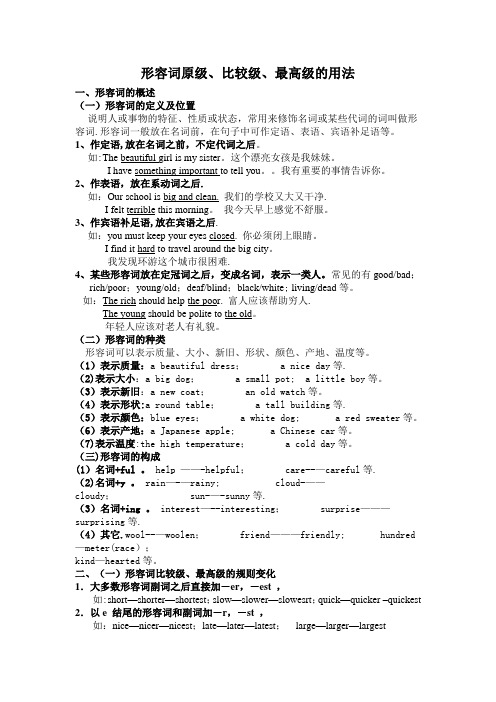
形容词原级、比较级、最高级的用法一、形容词的概述(一)形容词的定义及位置说明人或事物的特征、性质或状态,常用来修饰名词或某些代词的词叫做形容词.形容词一般放在名词前,在句子中可作定语、表语、宾语补足语等。
1、作定语,放在名词之前,不定代词之后。
如:The beautiful girl is my sister。
这个漂亮女孩是我妹妹。
I have something important to tell you。
我有重要的事情告诉你。
2、作表语,放在系动词之后.如:Our school is big and clean. 我们的学校又大又干净.I felt terrible this morning。
我今天早上感觉不舒服。
3、作宾语补足语,放在宾语之后.如:you must keep your eyes closed. 你必须闭上眼睛。
I find it hard to travel around the big city。
我发现环游这个城市很困难.4、某些形容词放在定冠词之后,变成名词,表示一类人。
常见的有good/bad;rich/poor;young/old;deaf/blind;black/white; living/dead等。
如:The rich should help the poor. 富人应该帮助穷人.The young should be polite to the old。
年轻人应该对老人有礼貌。
(二)形容词的种类形容词可以表示质量、大小、新旧、形状、颜色、产地、温度等。
(1)表示质量:a beautiful dress; a nice day等.(2)表示大小:a big dog; a small pot; a little boy等。
(3)表示新旧:a new coat; an old watch等。
(4)表示形状:a round table; a tall building等.(5)表示颜色:blue eyes; a white dog; a red sweater等。
形容词的定义
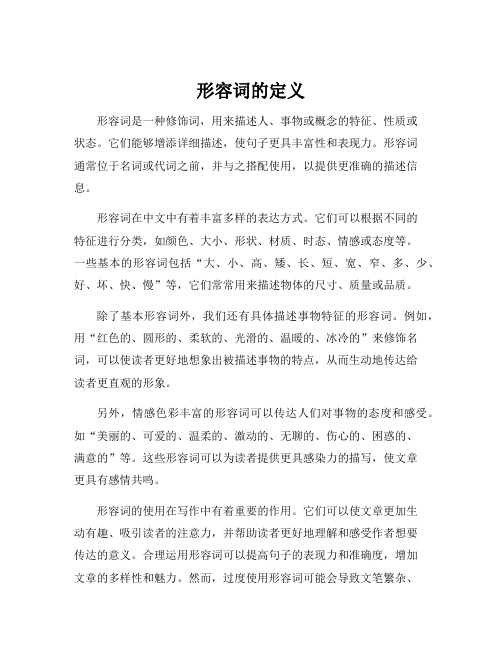
形容词的定义形容词是一种修饰词,用来描述人、事物或概念的特征、性质或状态。
它们能够增添详细描述,使句子更具丰富性和表现力。
形容词通常位于名词或代词之前,并与之搭配使用,以提供更准确的描述信息。
形容词在中文中有着丰富多样的表达方式。
它们可以根据不同的特征进行分类,如颜色、大小、形状、材质、时态、情感或态度等。
一些基本的形容词包括“大、小、高、矮、长、短、宽、窄、多、少、好、坏、快、慢”等,它们常常用来描述物体的尺寸、质量或品质。
除了基本形容词外,我们还有具体描述事物特征的形容词。
例如,用“红色的、圆形的、柔软的、光滑的、温暖的、冰冷的”来修饰名词,可以使读者更好地想象出被描述事物的特点,从而生动地传达给读者更直观的形象。
另外,情感色彩丰富的形容词可以传达人们对事物的态度和感受。
如“美丽的、可爱的、温柔的、激动的、无聊的、伤心的、困惑的、满意的”等。
这些形容词可以为读者提供更具感染力的描写,使文章更具有感情共鸣。
形容词的使用在写作中有着重要的作用。
它们可以使文章更加生动有趣、吸引读者的注意力,并帮助读者更好地理解和感受作者想要传达的意义。
合理运用形容词可以提高句子的表现力和准确度,增加文章的多样性和魅力。
然而,过度使用形容词可能会导致文笔繁杂、冗长,影响文章的清晰度和流畅性。
因此,在使用形容词时应当注意适度和合理运用,避免形容词过多或重复。
总而言之,形容词是一种在写作中非常重要的修饰词。
它们通过丰富多样的表达方式,给予事物更精准的描述,使文章更富有表现力和感染力。
合理运用形容词可以让读者更好地理解作者的意图,并为读者呈现出一个更立体、更生动的世界。
因此,在写作中,我们应该善于运用形容词,并充分发挥其描写和修饰的作用。
英语形容词辨认:识别形容词

英语形容词辨认:识别形容词形容词是英语语法中的重要组成部分,它用来修饰名词或代词,描述人、事、物的性质、特征、状态等。
在日常生活和学习中,准确识别形容词对于提高英语水平至关重要。
本文将介绍如何准确辨认和识别英语中的形容词。
一、形容词的定义和作用形容词是一种词性,描述和限定名词或代词所指的人或事物的性质、特征、状态等。
形容词可以放在名词前面或后面,用来修饰名词,使其更具体、生动和形象。
形容词可以增添句子的语义,让句子更加丰富多彩。
二、形容词的特点和识别方法1. 形容词的特点形容词通常具备以下几个特点:a) 形容词可以在句子中独立存在,形成形容词短语。
例如:The weather is beautiful today.(今天的天气很美丽。
)b) 形容词具有比较级和最高级形式。
例如:The weather is hotter than yesterday.(今天的天气比昨天热。
)2. 形容词的识别方法在句子中,判断一个词是否为形容词可以从以下几个方面入手:a) 形容词通常位于名词前面,修饰名词。
例如:a beautiful flower(一个美丽的花朵)b) 形容词通常位于系动词(be动词)后面,用来描述被系动词修饰的名词。
例如:The flower is beautiful.(这朵花很美丽。
)c) 形容词可以在句子中被副词修饰或者被程度副词修饰。
例如:very beautiful(非常美丽)三、常见形容词及其用法除了了解形容词的特点和识别方法外,在学习英语的过程中,还需要掌握常见的形容词及其用法。
以下是一些常见形容词及其用法的例子:1. 形容外貌的形容词beautiful(美丽的)、handsome(英俊的)、attractive(有吸引力的)、ugly(丑陋的)例句:She is a beautiful girl.(她是一个漂亮的女孩。
)He is a handsome man.(他是一个英俊的男人。
形容词是什么
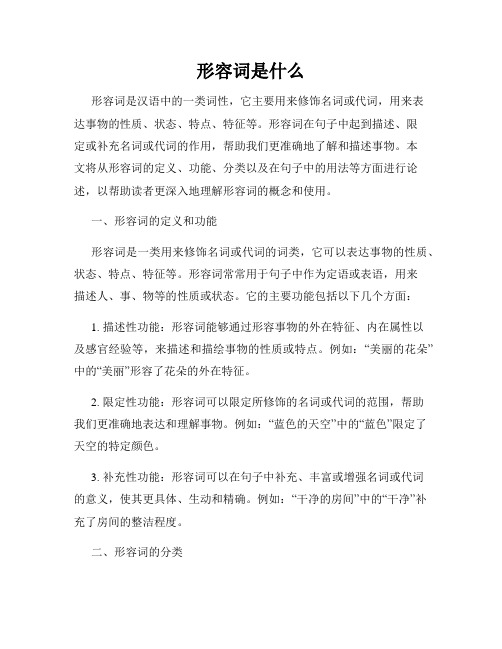
形容词是什么形容词是汉语中的一类词性,它主要用来修饰名词或代词,用来表达事物的性质、状态、特点、特征等。
形容词在句子中起到描述、限定或补充名词或代词的作用,帮助我们更准确地了解和描述事物。
本文将从形容词的定义、功能、分类以及在句子中的用法等方面进行论述,以帮助读者更深入地理解形容词的概念和使用。
一、形容词的定义和功能形容词是一类用来修饰名词或代词的词类,它可以表达事物的性质、状态、特点、特征等。
形容词常常用于句子中作为定语或表语,用来描述人、事、物等的性质或状态。
它的主要功能包括以下几个方面:1. 描述性功能:形容词能够通过形容事物的外在特征、内在属性以及感官经验等,来描述和描绘事物的性质或特点。
例如:“美丽的花朵”中的“美丽”形容了花朵的外在特征。
2. 限定性功能:形容词可以限定所修饰的名词或代词的范围,帮助我们更准确地表达和理解事物。
例如:“蓝色的天空”中的“蓝色”限定了天空的特定颜色。
3. 补充性功能:形容词可以在句子中补充、丰富或增强名词或代词的意义,使其更具体、生动和精确。
例如:“干净的房间”中的“干净”补充了房间的整洁程度。
二、形容词的分类形容词可以按照不同的分类标准进行分类。
一般来说,形容词可以分为以下几类:1. 基本形容词:基本形容词是最常见和最常用的形容词,它们常常直接描述事物的性质和特征,如“美丽的”、“快乐的”、“高大的”等。
2. 比较级形容词:比较级形容词用于表示两者之间的比较,它们一般以“更...”或“比...更...”的形式出现,如“更美丽的”、“比较高的”、“不那么快乐的”等。
3. 最高级形容词:最高级形容词用于表示三者或三者以上之间的比较,它们一般以“最...”的形式出现,如“最美丽的”、“最高的”、“最幸福的”等。
4. 构词形容词:构词形容词是通过添加前缀或后缀来构成的形容词,它们可以改变原词的含义或补充形容词的特点,如“忧郁的”、“相似的”、“无聊的”等。
5. 形容词性的量词:形容词性的量词是一种特殊的形容词,它们表示事物的数量或程度,如“很多的”、“少量的”、“非常重要的”等。
英语基础语法_形容词的定义、用法
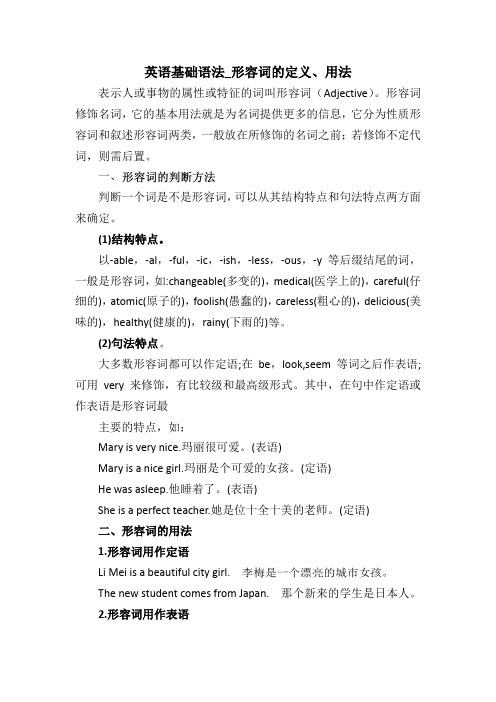
英语基础语法_形容词的定义、用法表示人或事物的属性或特征的词叫形容词(Adjective)。
形容词修饰名词,它的基本用法就是为名词提供更多的信息,它分为性质形容词和叙述形容词两类,一般放在所修饰的名词之前;若修饰不定代一、判断一个词是不是形容词,可以从其结构特点和句法特点两方面(1)结构特点。
以-able,-al,-ful,-ic,-ish,-less,-ous,-y等后缀结尾的词,一般是形容词,如:changeable(多变的),medical(医学上的),careful(仔细的),atomic(原子的),foolish(愚蠢的),careless(粗心的),delicious(美味的),healthy(健康的),rainy(下雨的)(2)句法特点大多数形容词都可以作定语;在be,look,seem等词之后作表语;可用very来修饰,有比较级和最高级形式。
其中,在句中作定语或作表语是形容词最Mary is very nice.玛丽很可爱。
(表语)Mary is a nice girl.玛丽是个可爱的女孩。
(定语)He was asleep.他睡着了。
(表语)She is a perfect teacher.她是位十全十美的老师。
(定语)二、形容词的用法1.形容词用作定语Li Mei is a beautiful city girl.The new student comes from Japan.2.形容词用作表语My father’s car is very expensive.The English story is very interesting.3.形容词用作宾语补足语Don’t keep the door open.His success made him happy.We finally found the dictionaries very useful.4.“the+形容词”用作主语及宾语The old often think of old things.The new always take the place of the old.5.形容词有时也可用作状语或补语Please speak loud and clear.These soldiers spent three days in the cold weather,cold and hungry.士兵们又冷又饿在严寒的气候中After seven days, the children came back from the forest safe.6.少数形容词只能作表语这些形容词包括ill,asleep,awake,alone,well,worth,glad,unable,afraid(正)Don’t be afraid.(误)Mr Li is an afraid man.(正)The old man was ill yesterday.(误)This is an ill person.(正)This place is worth visiting.(误)That is a worth book.7.这些形容词包括little,live(活着的),elder,eldest 等,只能作定语,不能作表语。
英语形容词的功用
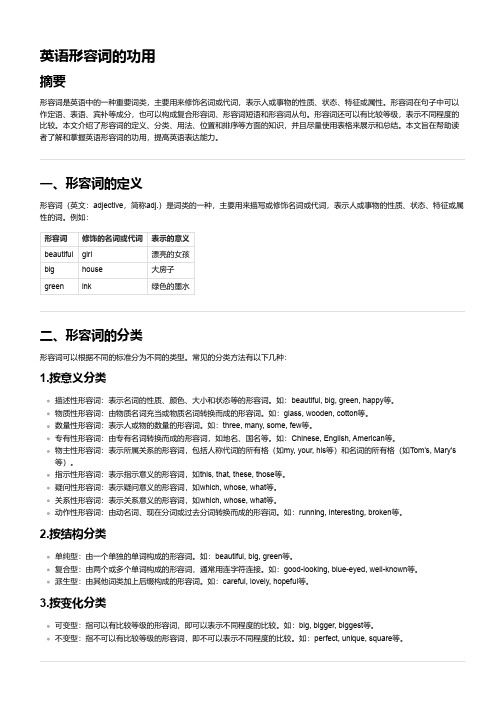
英语形容词的功用摘要形容词是英语中的一种重要词类,主要用来修饰名词或代词,表示人或事物的性质、状态、特征或属性。
形容词在句子中可以作定语、表语、宾补等成分,也可以构成复合形容词、形容词短语和形容词从句。
形容词还可以有比较等级,表示不同程度的比较。
本文介绍了形容词的定义、分类、用法、位置和排序等方面的知识,并且尽量使用表格来展示和总结。
本文旨在帮助读者了解和掌握英语形容词的功用,提高英语表达能力。
一、形容词的定义形容词(英文:adjective,简称adj.)是词类的一种,主要用来描写或修饰名词或代词,表示人或事物的性质、状态、特征或属性的词。
例如:形容词修饰的名词或代词表示的意义beautiful girl漂亮的女孩big house大房子green ink绿色的墨水二、形容词的分类形容词可以根据不同的标准分为不同的类型。
常见的分类方法有以下几种:1.按意义分类描述性形容词:表示名词的性质、颜色、大小和状态等的形容词。
如:beautiful, big, green, happy等。
物质性形容词:由物质名词充当或物质名词转换而成的形容词。
如:glass, wooden, cotton等。
数量性形容词:表示人或物的数量的形容词。
如:three, many, some, few等。
专有性形容词:由专有名词转换而成的形容词,如地名、国名等。
如:Chinese, English, American等。
物主性形容词:表示所属关系的形容词,包括人称代词的所有格(如my, your, his等)和名词的所有格(如Tom's, Mary's 等)。
指示性形容词:表示指示意义的形容词,如this, that, these, those等。
疑问性形容词:表示疑问意义的形容词,如which, whose, what等。
关系性形容词:表示关系意义的形容词,如which, whose, what等。
动作性形容词:由动名词、现在分词或过去分词转换而成的形容词。
- 1、下载文档前请自行甄别文档内容的完整性,平台不提供额外的编辑、内容补充、找答案等附加服务。
- 2、"仅部分预览"的文档,不可在线预览部分如存在完整性等问题,可反馈申请退款(可完整预览的文档不适用该条件!)。
- 3、如文档侵犯您的权益,请联系客服反馈,我们会尽快为您处理(人工客服工作时间:9:00-18:30)。
形容词定义[adjective 简称adj.或a.] 很多语言中均有的主要词类中的一种。
主要用来修饰名词的词,表示事物的特征。
形容词用来修饰名词或代词, 表示人或事物的性质, 状态,和特征的程度好坏,与否。
[编辑本段]英语中形容词的用法形容词在句中作定语, 表语, 宾语补足语。
She is a good student, and she works hard.她是一个好学生,她学习努力。
This bike is expensive.这辆自行车很贵。
I am sorry, I'm busy now.对不起,我现在很忙。
Have you got everything ready for the meeting?你为这次会议做好准备吗?形容词在句中的位置:形容词作定语一般放在被修饰的名词之前。
如果有两个或两个以上的形容词修饰一个名词时, 则由它们和被修饰的名词之间的密切程度而定, 越密切的形容词越靠近名词。
如果几个形容词的密切程度差不多则按音节少的形容词放在前面, 音节多的形容词放在后面。
英语单词中,something, anything, nothing 等不定代词被形容词修饰时,形容词放在名词后面。
I have something important to tell you.我有重要的事要告诉你。
Is there anything interesting in the film?电影里有什么有趣的内容吗?There is nothing dangerous here.这儿一点都不危险。
由两个或两个以上的词组成的形容词词组修饰名词时须放在名词之后。
This is the book easy to read.这是一本容易读的书。
用and 或or 连接起来的两个形容词作定语时一般把它们放在被修饰的名词后面。
起进一步解释的作用。
Everybody, man and woman, old and young, should attend the meeting.每一个人,男女老少,都应该参加会议。
You can take any box away, big or small.这些箱子,不管大小,你都可以拿走。
形容词的比较级和最高级:绝大多数形容词有三种形式,原级,比较级和最高级, 以表示形容词说明的性质在程度上的不同。
形容词的比较级和最高级:形容词的比较级和最高级形式是在形容词的原级形式的基础上变化的。
分为规则变化和不规则变化。
规则变化:1) 单音节形容词的比较级和最高级形式是在词尾加-er 和-est 构成。
great (原级) greater(比较级) greatest(最高级)2) 以-e 结尾的单音节形容词的比较级和最高级是在词尾加-r 和-st 构成。
wide (原级) wider (比较级) widest (最高级)3)少数以-y, -er, -ow, -ble结尾的双音节形容词的比较级和最高级是在词尾加-er 和-est 构成。
clever(原级) cleverer(比较级) cleverest(最高级)4) 以-y 结尾,但-y 前是辅音字母的形容词的比较级和最高级是把-y 去掉,加上-ier 和-est 构成.happy (原形) happier (比较级) happiest (最高级)5) 以一个辅音字母结尾其前面的元音字母发短元音的形容词的比较级和最高级是双写该辅音字母然后再加-er和-est。
big (原级) bigger (比较级) biggest (最高级)6) 双音节和多音节形容词的比较级和最高级需用more 和most 加在形容词前面来构成。
beautiful (原级) difficult (原级)more beautiful (比较级) more difficult (比较级)most beautiful (最高级) most difficult (最高级)不规则变化原级比较级最高级good better bestmany more mostmuch more mostbad worse worstold elder/older eldest/oldestlittle littler/less(er) littlest/leastill worse worstfar farther/further farthest/furthest形容词前如加less 和least 则表示"较不"和"最不"important 重要less important 较不重要least important 最不重要tired 累的more tired 更累的most tired 最累的形容词比较级的用法:形容词的比较级用于两个人或事物的比较,其结构形式如下:主语+谓语(系动词)+ 形容词比较级+than+ 对比成分。
也就是, 含有形容词比较级的主句+than+从句。
注意从句常常省去意义上和主句相同的部分, 而只剩下对比的成分。
Our teacher is taller than we are.我们老师的个子比我们的高。
It is warmer today than it was yesterday.今天的天气比昨天暖和。
This picture is more beautiful than that one.这张照片比那张照片漂亮。
This meeting is less important than that one.这次会议不如那次会议重要。
The sun is much bigger than the moon.太阳比月亮大得多。
形容词最高级的用法:形容词最高级用于两个以上的人和物进行比较, 其结构形式为:主语+谓语(系动词)+the+形容词最高级+名词+表示范围的短语或从句。
She is the best student in her class.她是班上最好的学生。
Shanghai is one of the biggest cities in China.上海是中国最大城市之一。
This is the biggest apple I have ever met.这是我见到的最大的苹果。
Tom is the tallest boy in his basketball team.汤姆是他们篮球队中个子最高的孩子。
几个特殊用法:most 同形容词连用而不用the,表示"极,很,非常, 十分"。
It's most dangerous to be here.在这儿太危险。
I cannot do it, it's most difficult.我干不了这件事,太难了。
"The+形容词比较级..., the+形容词比较级..."表示" 越... 就越..."。
The more you study, the more you know.你学的越多, 就知道的越多。
The more I have, the more I want.我越有就越想要有。
The more, the better.越多越好。
" 形容词比较级+ and + 形容词比较级", 表示" 越来越... "。
It's getting hotter and hotter.天气越来越热了.It's pity he is getting poorer and poorer.真可怜他越来越穷了。
The computer is cheaper and cheaper.计算机越来越便宜。
The more and more people focus on the meeting next year.越来越多的人关注明年的会议。
主语+谓语(系动词)+as+形容词原形+as+从句。
表示两者对比相同。
This box is as big as mine.这个盒子和我的一样大。
This coat is as cheap as that one.这件衣服同那件衣服一样便宜。
I study English as hard as my brother.我同我兄弟一样学习努力。
用形容词表示类别和整体the + 形容词表示某种人。
He always helps the poor.他经常帮助穷人。
I like to have a talk with the young.我喜欢同年轻人谈话。
The rich sometimes complain their empty life.富人有时抱怨他们空虚的生活。
The police led the old man across the street.警察领老人横过马路。
以-ly结尾的形容词1)大部分形容词加-ly可构成副词。
但friendly,deadly,lovely,lonely,likely,lively,ugly,brotherly,仍为形容词。
改错:(错)She sang lovely.(错)He spoke to me very friendly.(对)Her singing was lovely.(对)He spoke to me in a very friendly way.2)有些以-ly 结尾的词既为形容词,也为副词。
daily,weekly,monthly,yearly,earlyThe Times is a daily paper.The Times is published daily.多个形容词修饰名词的顺序多个形容词修饰名词时,其顺序为:限定词--数词--描绘词--(大小,长短,形状,新旧,颜色) --出处--材料性质,类别--名词a small round tablea tall gray buildinga dirty old brown shirta famous German medical schoolan expensive Japanese sports car一般与被修饰形容词关系密切的形容词靠近名词;如果几个形容词的重要性差不多,音节少的形容词在前,音节多的方在后,在不能确定时,可参照下表:限定词+数量词(序数词在前,基数词在后)+性状形容词+大小、长短、高低等形体+ those + three + beautiful + large + square新旧+颜色+国籍+材料+名词old + brown + wood + table典型例题:1)Tony is going camping with ___ boys.A.little two otherB. two little otherC.two other littleD.little other two答案:C。
